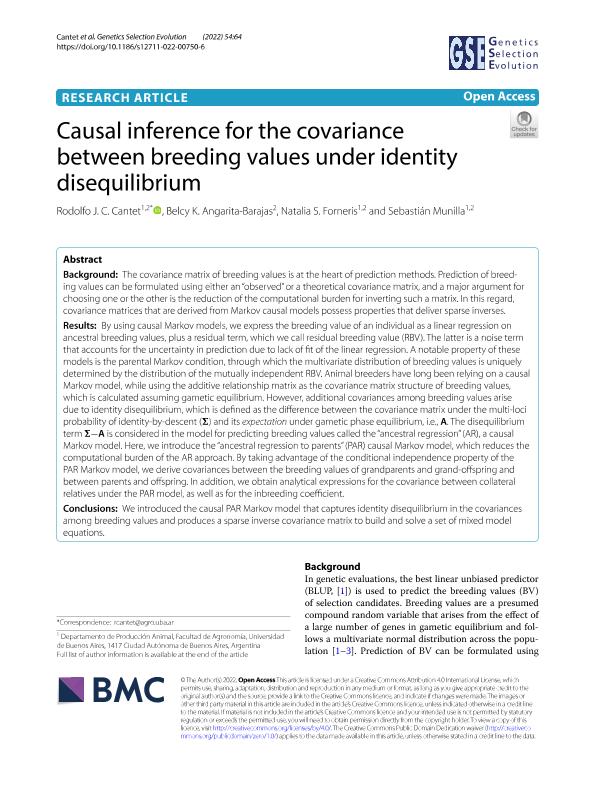Artículo
Causal inference for the covariance between breeding values under identity disequilibrium
Cantet, Rodolfo Juan Carlos ; Angarita Barajas, Belcy Karine
; Angarita Barajas, Belcy Karine ; Forneris, Natalia Soledad
; Forneris, Natalia Soledad ; Munilla Leguizamon, Sebastian
; Munilla Leguizamon, Sebastian
 ; Angarita Barajas, Belcy Karine
; Angarita Barajas, Belcy Karine ; Forneris, Natalia Soledad
; Forneris, Natalia Soledad ; Munilla Leguizamon, Sebastian
; Munilla Leguizamon, Sebastian
Fecha de publicación:
12/2022
Editorial:
BioMed Central
Revista:
Genetics Selection Evolution
ISSN:
1297-9686
Idioma:
Inglés
Tipo de recurso:
Artículo publicado
Clasificación temática:
Resumen
Background: The covariance matrix of breeding values is at the heart of prediction methods. Prediction of breeding values can be formulated using either an “observed” or a theoretical covariance matrix, and a major argument for choosing one or the other is the reduction of the computational burden for inverting such a matrix. In this regard, covariance matrices that are derived from Markov causal models possess properties that deliver sparse inverses. Results: By using causal Markov models, we express the breeding value of an individual as a linear regression on ancestral breeding values, plus a residual term, which we call residual breeding value (RBV). The latter is a noise term that accounts for the uncertainty in prediction due to lack of fit of the linear regression. A notable property of these models is the parental Markov condition, through which the multivariate distribution of breeding values is uniquely determined by the distribution of the mutually independent RBV. Animal breeders have long been relying on a causal Markov model, while using the additive relationship matrix as the covariance matrix structure of breeding values, which is calculated assuming gametic equilibrium. However, additional covariances among breeding values arise due to identity disequilibrium, which is defined as the difference between the covariance matrix under the multi-loci probability of identity-by-descent (Σ) and its expectation under gametic phase equilibrium, i.e., A. The disequilibrium term Σ−A is considered in the model for predicting breeding values called the “ancestral regression” (AR), a causal Markov model. Here, we introduce the “ancestral regression to parents” (PAR) causal Markov model, which reduces the computational burden of the AR approach. By taking advantage of the conditional independence property of the PAR Markov model, we derive covariances between the breeding values of grandparents and grand-offspring and between parents and offspring. In addition, we obtain analytical expressions for the covariance between collateral relatives under the PAR model, as well as for the inbreeding coefficient. Conclusions: We introduced the causal PAR Markov model that captures identity disequilibrium in the covariances among breeding values and produces a sparse inverse covariance matrix to build and solve a set of mixed model equations.
Archivos asociados
Licencia
Identificadores
Colecciones
Articulos(INPA)
Articulos de UNIDAD EJECUTORA DE INVESTIGACIONES EN PRODUCCION ANIMAL
Articulos de UNIDAD EJECUTORA DE INVESTIGACIONES EN PRODUCCION ANIMAL
Citación
Cantet, Rodolfo Juan Carlos; Angarita Barajas, Belcy Karine; Forneris, Natalia Soledad; Munilla Leguizamon, Sebastian; Causal inference for the covariance between breeding values under identity disequilibrium; BioMed Central; Genetics Selection Evolution; 54; 1; 12-2022; 1-14
Compartir
Altmétricas



